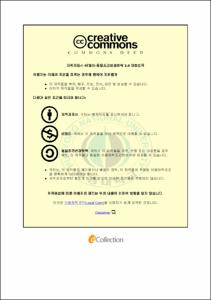미디어교육프로그램 참여와 아동의 성격유형이 미디어능력 향상에 미치는 연구
- Alternative Title
- A study on the effect of Media Education Participation and type of child personality on the Media Skill Improvement -Focused on the Media Education in Busan Community Media Center
- Abstract
- A study on the effect of Media Education Participation and type of child personality on the Media Skill Improvement
-Focused on the Media Education in Busan Community Media Center-
Jung, kyung soon
Department of Mass Communication, the Graduate School,
Pukyong National University
Abstract
This study is to survey the effect of media skill improvement between the produced programs (News/Non-News) and the types of child's personality (extrovert/introvert) based on the children to participate in the media education in Busan Community Media Center (hereinafter "media center").
Therefore, Baacke's media ability concept of perception/knowledge, criticism/comments, use/interactive and production/configuration capabilities was quoted and target people for research was the children of 321 to attend the media education program at media center from last April till 2nd week of May.
Questionnaire was covering the improvement of media skill before and after the media education, and the children's personality of extrovert/ introvert and the satisfaction of the media education and from the survey reply collected, the factor analysis, t-test, General Linear Analysis and two-way ANNOVA was analysed using the program SPSS 12,0.
The result showed that media skill based on the participation type between produced programs, was all the more enhanced the non-News program rather than News program by mean of program participation.
The introvert children has more improvement of media skill than the extrovert and this is the most remarkable fact in this study. In particular, the introvert children has more improvement of media ability in non-News than News. This mean the introvert children is likely to be not positive, cautious and not reveal himself easily, but they enjoy lots of attention on an independent job, observations, and doing to solve the problem, which is the general characteristics of introvert.
I guess this kind of introvert characteristic certainly demonstrate their ability in production education in the field in the Media Center After all, the media education in the Media Center showed the effect of media skill improvement, We find the significance meaning of this study from viewpoint of the enhancement of the introvert/extrovert children's inherent ability.
- Issued Date
- 2011
- Awarded Date
- 2011. 8
- Type
- Dissertation
- Publisher
- 부경대학교
- Alternative Author(s)
- Jung Kyung Soon
- Affiliation
- 부경대학교 신문방송학과 대학원
- Department
- 대학원 신문방송학과
- Advisor
- 김용호
- Table Of Contents
- 목차
Abstract
제 1장. 서론 1
제 1절. 문제 제기 및 연구 목적 1
제 2절. 논문의 연구절차 및 연구모형 5
1. 연구절차 5
2. 연구모형 6
제 2장. 이론적 배경 7
제 1절. 미디어교육의 정의 7
1. 미디어교육의 개념 7
2. 미디어교육의 목표 9
3. 미디어교육의 변화 12
4. 미디어교육의 최근 연구 동향 16
제 2절. 미디어교육의 커뮤니케이션 행위론적 접근 18
1. 미디어능력 18
1) 바아케의 미디어능력 20
2) 미디어능력의 구성범주 22
2. 커뮤니케이션과 미디어능력의 상관성 25
제 3절. 아동의 성격유형 27
1. 성격이론 27
2. Jung의 심리유형론 28
3. 아동의 성격유형과 학업성취에 관한 연구 30
제 4절. 체험교육의 중요성 32
1. 체험교육의 정의 32
2. 체험교육으로서의 미디어교육 34
3. 미디어센터의 미디어교육 36
4. 방송통신위원회 부산시청자미디어센터의 미디어교육 38
제 3장. 연구문제 및 연구방법 40
제 1절. 연구문제 40
제 2절. 연구방법 42
1. 연구대상 42
2. 측정도구 43
1) 미디어능력에 대한 문항 구성 43
2) 성격유형(외/내향성)에 대한 문항 구성 44
3) 미디어교육 만족도에 대한 설문 구성 46
3. 분석방법 46
제 4장. 연구결과 및 논의 47
제 1절. 조사대상 아동의 일반적 특성 47
제 2절. 미디어교육전후 미디어능력과 외/내향 신뢰도 분석 48
제 3절. 분석 결과 49
1. 뉴스와 비뉴스 교육 전후 미디어능력 향상의 차이 49
2. 성격유형에 따른 뉴스와 비뉴스 교육전후 미디어능력 향상의 차이 50
1) 지각/지식능력 51
2) 비판/비평능력 55
3) 이용/상호작용능력 59
4) 제작/구성능력 63
3. 교육 만족도 67
제 5장. 요약 및 결론 72
제 1절. 요약 72
제 2절. 결론 73
참고 문헌 77
부록 84
1. 설문지 84
2. 뉴스 제작안 89
3. 라디오 제작안 90
4. 드라마 제작안 91
5. 토론 제작안 92
- Degree
- Master
- Files in This Item:
-
-
Download
 미디어교육프로그램 참여와 아동의 성격유형이 미디어능력 향상에 미치는 연구.pdf
기타 데이터 / 1.36 MB / Adobe PDF
미디어교육프로그램 참여와 아동의 성격유형이 미디어능력 향상에 미치는 연구.pdf
기타 데이터 / 1.36 MB / Adobe PDF
-
Items in Repository are protected by copyright, with all rights reserved, unless otherwise indicated.